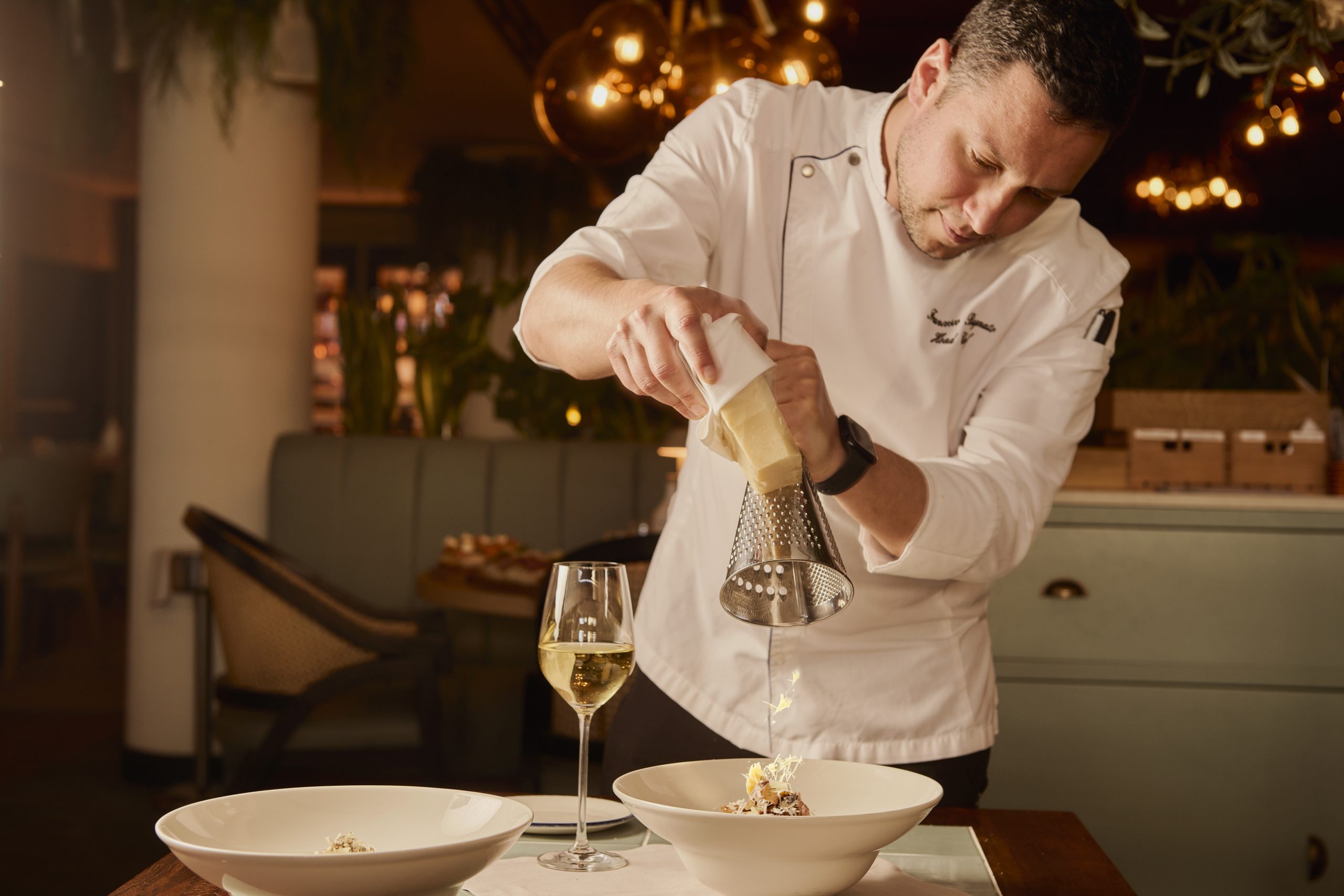“I believe that food is a way to talk about yourself, about your tradition, about where you come from, about different nations, different countries,” says Francesco Bagnato, Brand Chef at Isola Ristorante Italiano, as we sit down at METT Marbella | Estepona, the upscale lifestyle beachside resort on the Andalusian Costa del Sol.
The Calabrian-born chef has quickly risen through the culinary ranks to become the visionary behind Isola Ristorante Italiano, a culinary brand of Dubai-based Sunset Hospitality Group that has expanded from its Dubai origins to Bodrum, Marbella, Bouznika, and most recently, Milan, where the restaurant overlooks the iconic Duomo. As I speak with Bagnato, his passion for Italian cuisine is immediately evident, not just for preserving traditions, but for elevating them for a new generation.
Tell us a bit about your background and how you got started in the culinary world.
My mother worked in the kitchen of one of the best restaurants in Calabria. That’s where I first got to know hospitality. Although I attended hospitality school, I first became involved when my mother took me to work. I was young, probably a little too young by law to be there, but I started working at a beach bar and then in restaurant service.
When I saw the kitchen, I discovered something special, more engaging, a place with more connection, more love, where people supported each other to make things happen. I began to get deeply involved. Even though I was good on the restaurant floor and at the bar (and my manager wanted me to continue there) I said, “No, I want to go to the kitchen.”
I must admit, I wasn’t so good in the kitchen at the beginning, but slowly, with time I learned more and more, I was curious. I travelled to Rome and met very professional chefs who completely opened my mind. I worked at a historical Roman restaurant on the Piazza di Spagna, in the centre of Rome. They hired me to do breakfast, which was a lower position, but I was excited to work in a five-star hotel and see the sophisticated preparation of food. I was just 20 or 21 years old.
I kept pushing to move up to the sixth floor where the main restaurant was. They eventually took me up because they saw I was enthusiastic and strong-willed. Every night when I took the elevator, I was emotional. The connection we had, 11 chefs in a very small kitchen, was like poetry. We were connected with each other, creating elegant service. For me, it was extraordinary.
How did your experience grow from there?
After Rome, I began to discover Italy more profoundly. Coming from the south, I travelled north to the Verona region to learn about wine. I became passionate about wine, studying with sommeliers every Monday when the restaurant was closed. Later, I worked in Venice, another beautiful city full of culture and tradition.
After getting to know all these Italian traditions, I went to Switzerland for more experience. Then my chef offered me an amazing opportunity. He asked me to come to Dubai as his sous chef for a new Italian restaurant. I told him I wasn’t ready, that my English wasn’t good enough, but he believed in me. “You can make it. In three months, you’ll be fine. Build yourself up and do it,” he said. I was 24.
This challenge empowered me. When I arrived in Dubai, I watched Netflix and listened to music to improve my English. I had to figure out how to manage the kitchen, manage my team, and answer all their questions, especially during busy times. The language barrier was significant. After about a year, I became much more comfortable, changed jobs, and found new opportunities that developed my career.
What was your defining moment as a chef?
When I heard that Chef Massimo Bottura, one of the best chefs in the world, was moving to Dubai, I did everything I could to get a position with him. I was hired and eventually promoted to sous chef under him.
Working with Bottura, I realised that what we do is so much more than food, it’s a vast culture behind the food. Everything he and his team did had a story behind it. You become more enthusiastic about what you do when you feel that it’s special. You’re not just feeding people with pasta; you’re nourishing them with experience, knowledge, and culture. That was a transformative experience for me.
How did you connect with Sunset Hospitality Group and Isola?
During COVID, when many kitchen staff were away from work, I had to run the business with very few people. This made me even more confident in my cooking abilities and ready for something new.
I did a food tasting for the executives of Sunset Hospitality. I was very confident and just cooked as myself. They liked it a lot, with almost no negative feedback. I was 27 when I started the big challenge of Isola. I didn’t think I was ready, but I believed in myself and saw it as an opportunity to grow.
I realised I needed to build my team, empower them, and share as much knowledge as I could so they could work effectively even when I wasn’t there. We had a very international team in Dubai, mostly Asians, Sri Lankans, Filipinos, Indians, and some Italians. It was challenging to introduce Italian culinary culture to people who weren’t born with it. In Europe and Italy, you grow up with bread and pasta—these are common things. But with hard work, we made it happen.
How does the concept of Isola align with your personal culinary philosophy?
The concept of Isola matched perfectly with where I come from. I’m from the south of Italy, close to Sicily, from my house, you can see the volcano of Stromboli. We have good food in our DNA. I realised Isola was my opportunity to express this heritage.
We focus on making simple dishes in the best way possible. For example, a very simple spaghetti alle vongole might be offered in all Italian restaurants, but I wanted to make it the best way possible. Some people don’t believe that simple dishes can be extraordinary, but when you put love into them, they become special.
At Isola Marbella, guests can experience signature dishes like Carpaccio di cuore di bue, a stunning local tomato carpaccio with pecorino cheese, oregano and garlic chips that showcases the exceptional Andalusian tomatoes, or the delicate Scaloppine di vitello al limone, featuring tender veal sirloin in a bright lemon sauce.
At some point, I was so dedicated to Isola that I wasn’t going out much, but I would hear people say, “There’s a new Italian restaurant in Dubai that’s amazing.” The simple things, when you put love into them, become wild and unexpected.
Isola has expanded rapidly across different countries. How do you maintain quality across such diverse locations?
After we opened the first Isola, which became my creation, my manager told me, “We’re going to open in Bodrum, then Marbella, Morocco, and Milan.” They all came together quickly, but after doing the first one, you understand the process.
Adapting to different locations isn’t easy. Places like Marbella and Milan have exceptional ingredients, products, and fresh items right around the corner, with different specialties each season. The biodiversity is huge across our locations.
Our Polpo grigliato is another favourite, grilled octopus served with potato cream and tomato confit.
For example, Morocco is a Mediterranean country, but importing Italian products there was challenging. We brought in Italian olive oil after a very long process, but for cooking, we adapted and used Moroccan olive oil. Their vegetables were amazing, not always the same size as what we were used to, but with incredible flavour. The fish was excellent too, but consistency was the challenge. If the fisherman didn’t go out, we wouldn’t have our supply.
In Bodrum, the restaurant has a spectacular position on top of the Bodrum castle with amazing views. The vegetables there were also very tasty and fresh, but consistency of fish and meat was sometimes challenging. We managed to find good quality and make it work.
Italian cuisine seems to be the world’s favourite food. What have you learned about its global appeal?
Before I left Italy, I thought each country loved its own food the most. But when I went to Dubai, I understood how important our Italian food is globally and how people appreciate it and truly enjoy pasta. The respect people have for Italian cuisine is remarkable.
How do you see the vision of Isola evolving as you expand?
It’s both exciting and challenging. People travel a lot nowadays, and sometimes they’ve experienced inauthentic versions of Italian dishes. For example, someone might have tried “carbonara” made by a non-Italian chef using cream, and when they taste the real version, they give negative feedback. Educating guests can be challenging, but we embrace it.
I tell my team in Dubai, “I am happy to get feedback because the pasta is al dente, but I will not accept complaints about overcooked pasta.” That’s our standard. We serve pasta the true Italian way, al dente and eventually, people come to appreciate it. There are many Italian communities in our locations who recognize authentic food, and non-Italians who want to experience the culture eventually come to love it too.
We try to preserve tradition as much as possible, but we also introduce thoughtful innovations. In summer, we might serve cacio e pepe, a classic Roman dish, with red prawns and lemon zest for freshness. We elevate traditional dishes with small, thoughtful touches.
Your pinsas has become one of Isola’s signatures. Can you tell me more about it?
As Italians, we’re most familiar with round Neapolitan pizza. When we opened Isola, we wanted to offer something different. We went back to the Roman tradition of pinsa, which is displayed in long trays with many different toppings and colours.
After experimenting with different flours, we developed our standard. At first, some customers would tell me, “You’re not Italian; this is not pizza.” I would explain that pinsa is from the same family as pizza but is a different style. We make the dough 48-72 hours in advance, then prepare a second dough in the morning, allowing it to proof. The result is very light—different from pizza.
We top our pinsas with the best ingredients we can find. Guests particularly love our Pinsa mortadella e pistacchio, which combines mortadella with creamy burrata cheese and pistachios, and the Pinsa guanciale scamorza affumicata with potato, guanciale and smoked scamorza, a perfect balance of flavours and textures. Here in Marbella, our bestseller is the mortadella and pistachio pinsa. People really love it.
Tell us about the new dishes for your 2025 menu.
We’ve created dishes that evoke summer freshness. We have a sea bass carpaccio with almond milk and lime. Lime is an interesting ingredient that adds freshness and is popular everywhere now. We’ve also created a spaghetti cacio e pepe with red prawns on top, which combines tradition with a twist.
For our risotto, we’re using wild herbs and scallops, perfect for a beach location. For the coming season, we’re also developing a Tagliolini con Scampi, Salsa allo Zafferano e Caviar, which will feature tagliolini pasta with langoustines in a creamy saffron sauce, finished with a touch of caviar.
And we have a new pinsa with guanciale, potato, and smoked scamorza. It’s something new that people are discovering and enjoying.
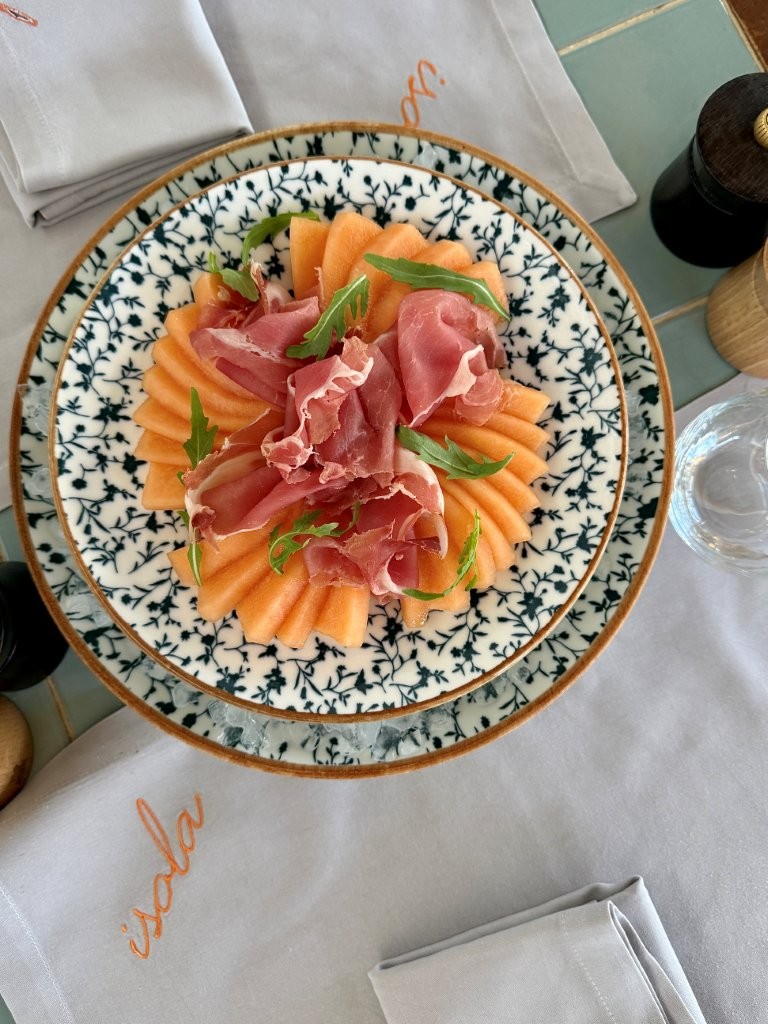
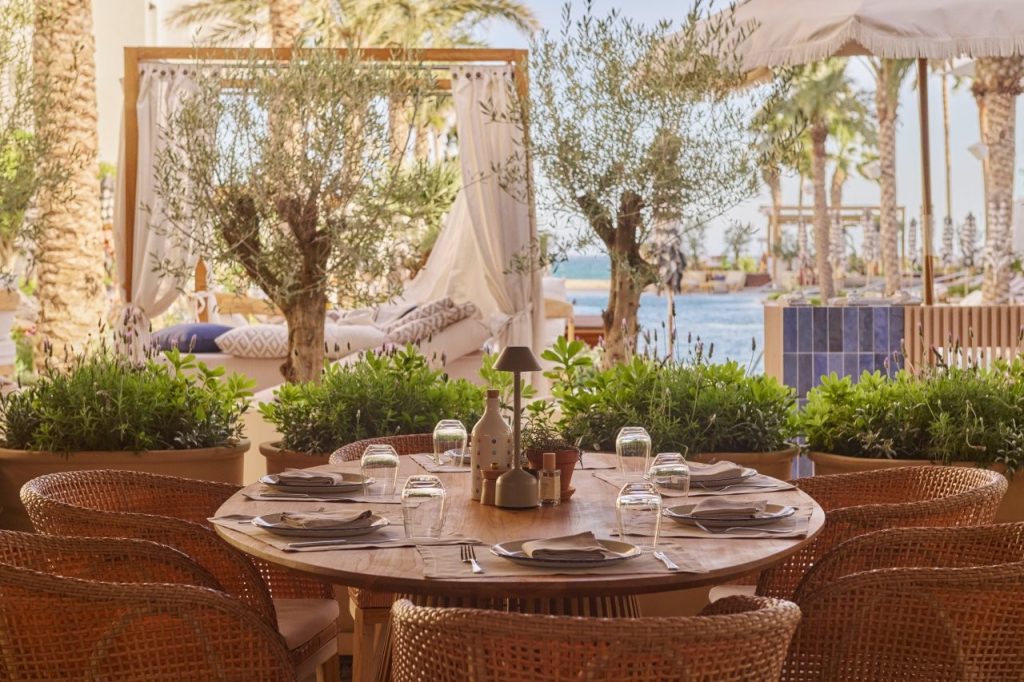
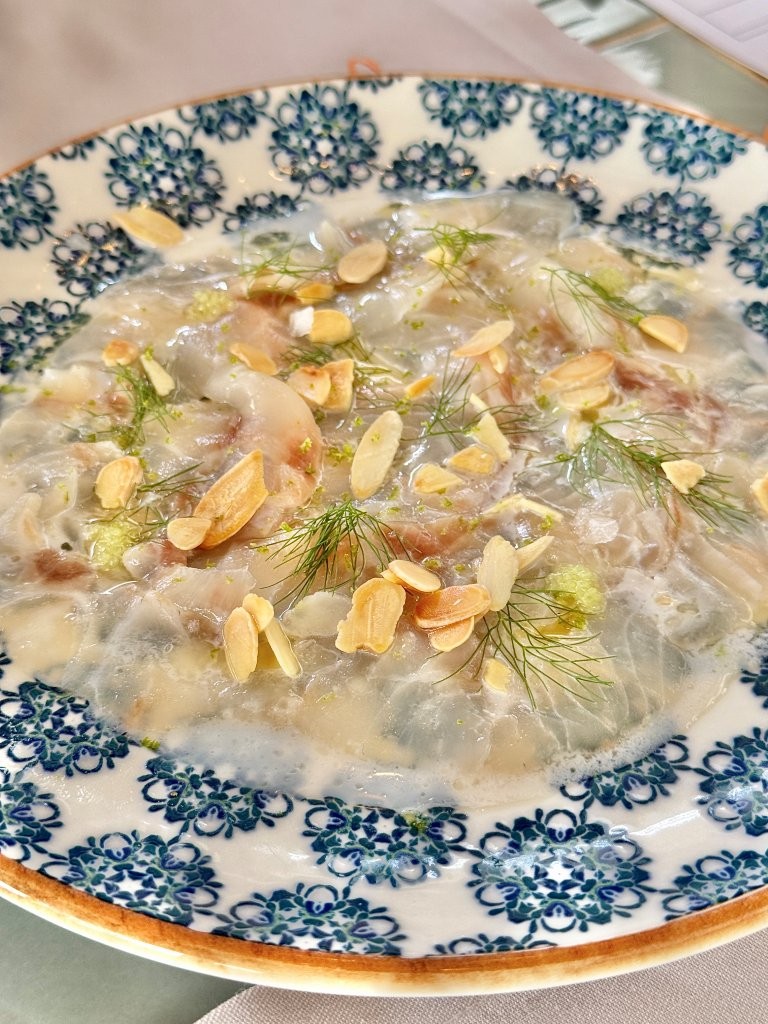
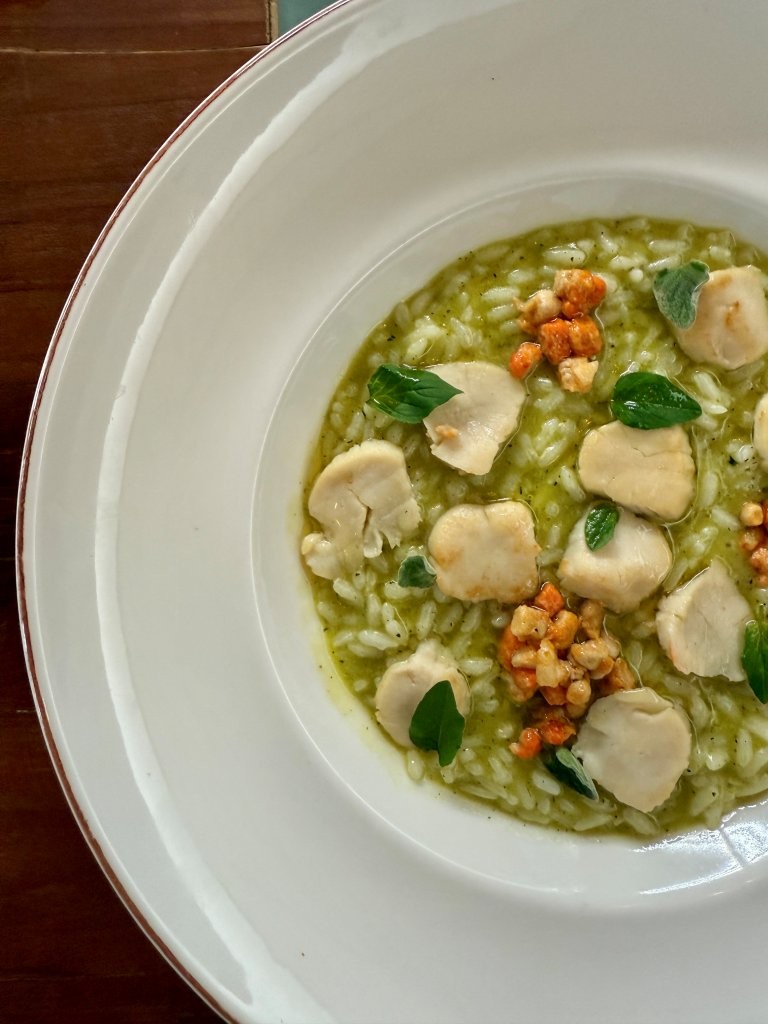
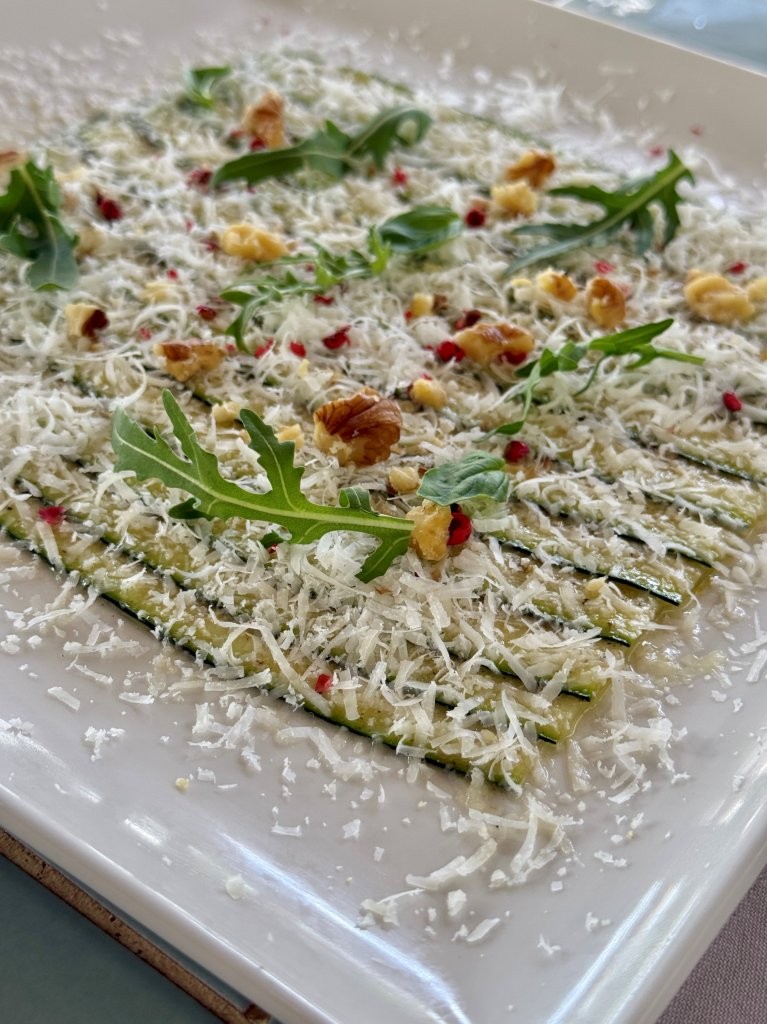
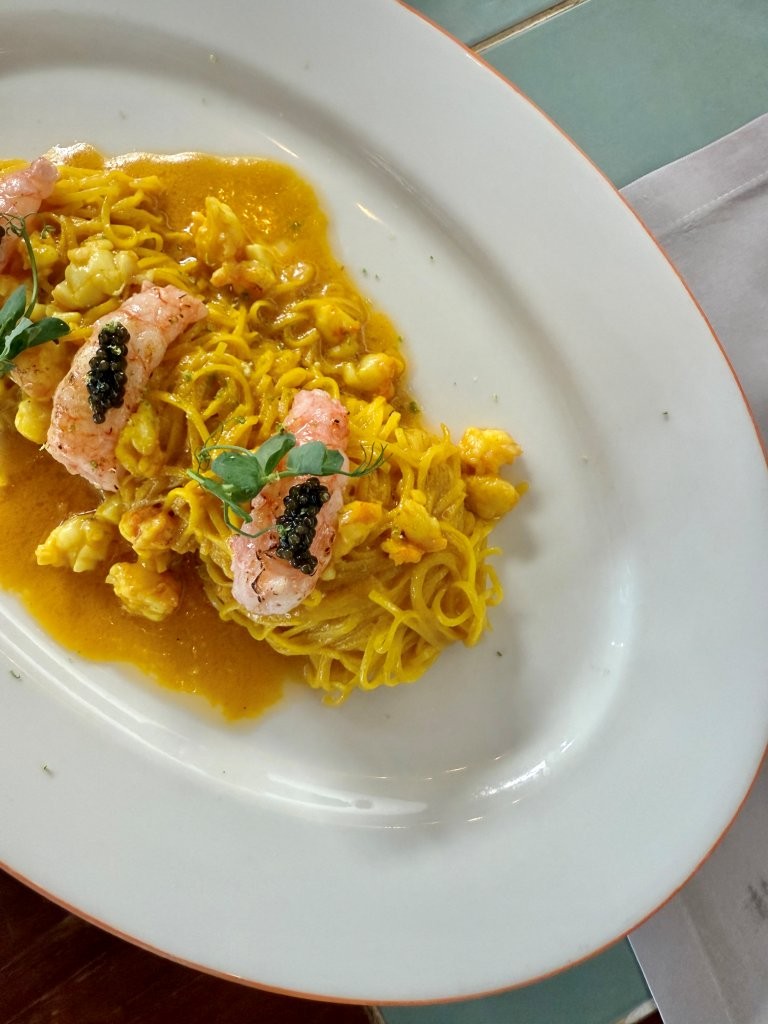
Your approach balances tradition with innovation. How would you describe that philosophy?
I believe in not forgetting tradition—that’s our foundation. But sometimes we need to evolve. If you never change, everyone will make the same dishes everywhere, just in slightly different ways. We try to elevate ingredients that might otherwise be overlooked.
For example, the herbs we use in the kitchen might be thrown away the next day. I don’t think that’s right. You can use them for decoration or infusions, then dry them to make powders or sauces. Everything becomes important. As chefs, we have a responsibility toward sustainability.
I tell my team that the garbage bin is not their friend. When you throw something away without thinking, you’re losing an opportunity. Our grandparents and parents would always check what needed to be used first in the refrigerator and cook with that. That’s the foundation of being a chef—not standardising everything but using creativity to minimise waste and maximise flavour.
You’ve achieved so much at a young age. What’s your secret to success?
I believe that if you want to be a great chef, you must be patient. Some people go into the kitchen because they don’t know what else to do, but they’re not patient – they’ll never create new dishes or see possibilities. I was fortunate to collaborate with great chefs who had big minds, who taught me that cooking is knowledge being passed down.
I always question myself: “Why am I doing this? Am I doing it right, or am I doing it wrong?” It’s very important to constantly question yourself and be open to improvement. This helps you challenge yourself and innovate.
Where do you see fine dining heading in the future?
I’ve worked in Michelin-starred restaurants in Italy and visited some here in Spain because I’m curious and want to try everything. They give amazing experiences with a story behind every dish, which is beautiful. But sometimes they can be a bit formal.
What I’ve learned from Isola’s customers is that people are very happy when they see a beautiful plate of spaghetti alle vongole that meets their expectations. When you see their joy after they finish, even asking for extra bread to clean the plate, enjoying a glass of wine, that’s what a restaurant should be. We don’t need to lose that tradition.
I believe food brings people together. As I said in my first interviews in Dubai when my English wasn’t so good, “The food talks.” When you cook good food and people from far away say “This is amazing,” you understand that people are enjoying it. Food is a way to talk about yourself, your tradition, where you come from. It connects different nations and countries.
Thank you, Francesco, for sharing your culinary journey and vision for Isola with us. It’s clear that your commitment to both honouring traditions and thoughtfully innovating is what makes Isola so special across its international locations. With an extensive wine selection from Italy’s finest wine regions and a menu that celebrates the authentic flavours of southern Italy, Isola offers a deliciously sociable dining experience.
You can read here the The Luxury Editor reviews of METT Marbella Estepona and METT Bodrum.

